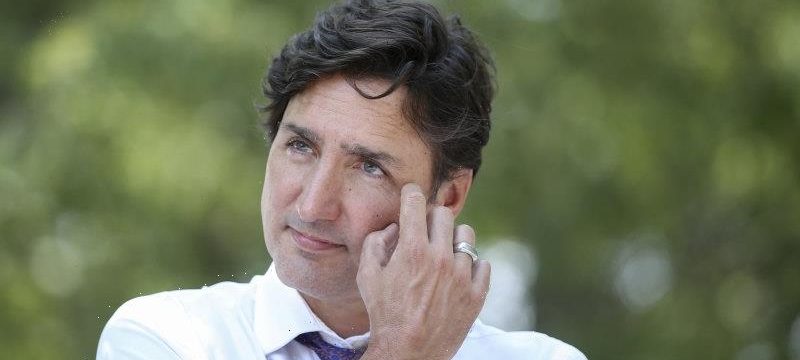Windsor, Ontario: As the Canadian Prime Minister stepped off his campaign bus at the University of Windsor’s campus, the feeble chants of “Trudeau, Trudeau” from his red-clad supporters were quickly drowned out by an angry crowd of anti-vaccine protesters.
“Get out of Windsor, you f—ing traitor,” one woman shouted into her megaphone. Behind her, a man drove by in a white truck with “f— Trudeau” scrawled across it.
Canadian Prime Minister Justin Trudeau has faced heated responses throughout the election campaign.Credit:Bloomberg
It was as clear an illustration as any of the bitter divisions the election campaign here has exposed.
When he called the snap election last month, Mr Trudeau hoped that his double-digit lead in the polls would regain him the majority he lost in 2019.
Instead, Canadians have responded with frustration. Many have asked whether a $657 million election was necessary when the country is facing a fourth wave of COVID-19 cases and soaring national debt. As he made his last dash across the province of Ontario before the election on Monday, Mr Trudeau’s final pitch was to the undecided progressive voters who hold his fate in their hands.
“The only progressive choice to get the big things done in government is the Liberal Party of Canada,” the Prime Minister told supporters in Windsor, a manufacturing town, across the river from the US city of Detroit.
A demonstrator shouts in front of supporters of Justin Trudeau, Canada’s prime minister, before a campaign stop in Bolton, Ontario.Credit:Cole Burston/Bloomberg
Mr Trudeau’s Liberal Party is hoping to see off strong support for both the Conservative Party and the left-leaning New Democratic Party (NDP) to win back seats in the battleground region.
His opponents have sought to paint the race as a cynical power grab.
“He’s always looking out for number one,” said Erin O’Toole, his main rival and the Conservative Party leader.
Jagmeet Singh, the leader of the NDP, also called the Prime Minister “selfish”.
Conservative leader Erin O’Toole, left, and Liberal leader Justin Trudeau speak during the federal election French-language leaders debate.Credit:Justin Tang/The Canadian Press via AP
The 49-year-old Trudeau has struggled to counter that narrative and offer a strong reason for bringing Canadians to the ballot box two years early. The result has been a steep drop in the polls. With his political future now hanging in the balance, Mr Trudeau has been forced to defend his six-year record.
His reign began in 2015 with a promise of “sunny ways”, when he pulled off a stunning election win to secure a majority government.
But after two terms in power, the shine has come off. His high-profile pledges to champion human rights, and tackle climate change and social inequalities have yielded little and left many disappointed.
Some of Mr Trudeau’s biggest critics are his own former MPs. They include his former attorney general, Jody Wilson-Raybould, who accused Mr Trudeau of pressuring her to drop a criminal prosecution into engineering company SNC-Lavalin.
The scandal was resurrected this week with the release of Ms Wilson-Raybould’s bombshell memoir and its critique of Mr Trudeau’s character.
To add to Mr Trudeau’s woes, his campaign has appeared unprepared for the election he called. By contrast Mr O’Toole, until recently an unknown quantity to Canadians, has been praised by conservative strategists for his “flawless” campaign and broad appeal to voters.
The two leaders’ parties are now tied in the polls. Data analysts say the level of turnout, always unpredictable in a pandemic, will determine the result. “Interest in this campaign is lower than it’s been in the last two elections,” said David Coletto, from polling company Abacus Data.
“I think in part because while Liberal supporters don’t want a Conservative government, they’re still annoyed at the Prime Minister for calling this election in the first place, whereas Conservative supporters just really don’t like Trudeau, and that dislike motivates them.”
Mr Trudeau made a rare acknowledgement that his pandemic election had been unpopular with the country as he urged voters to put their feelings aside during his campaign stop in Windsor on Friday.
“I understand the frustration that some people are feeling,” he said.
“They just want things to get back to normal and an election isn’t getting back to normal.
“It’s a time of choice, it’s a time of decision, it’s a time of stepping up, but Canadians did step up after this past 18 months. And right now, on Monday, we have a choice to be there for each other once again.”
Canadians are now bracing for the possibility of more division and uncertainty if neither the Liberals nor the Conservatives can secure most of the 338 seats in parliament.
Mr Trudeau’s backers warn against underestimating him, describing him as at his best when he is under pressure and a “heck of a campaigner”.
Political commentators also note that the Liberals’ strong support in the suburbs and cities hold more value under Canada’s parliamentary system than Mr O’Toole’s support in the rural Conservative heartlands.
As Mr Trudeau made his appeal from the roof of a university building, the expletive-laden chants of protesters could be heard on the street below.
The Sunday Telegraph with Washington Post
Most Viewed in World
From our partners
Source: Read Full Article



